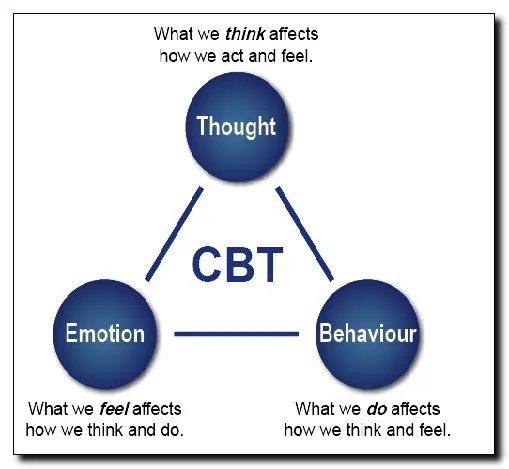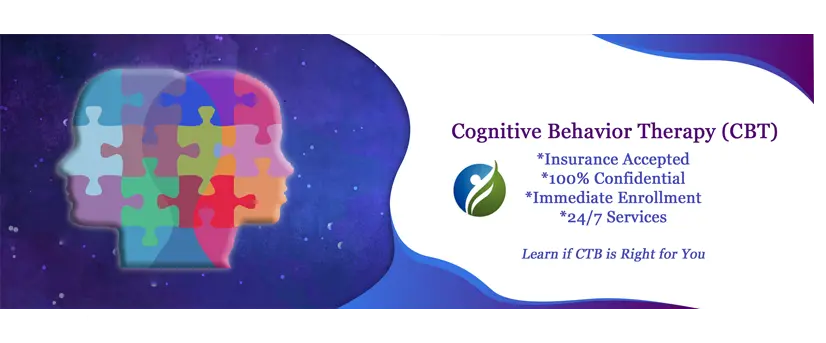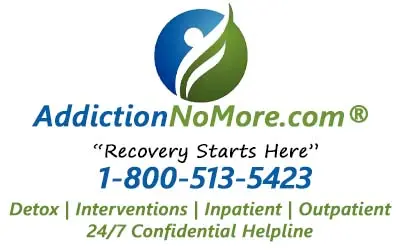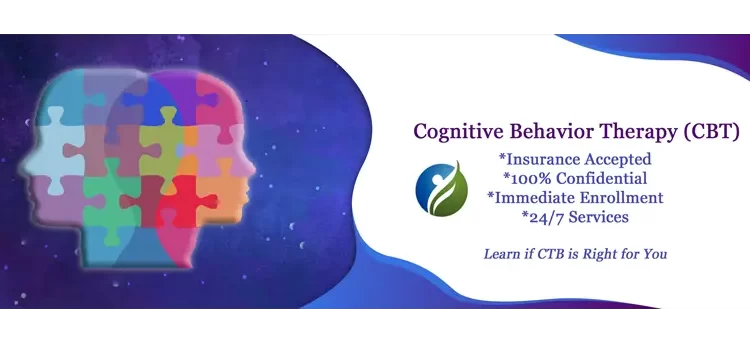Cognitive Behavior Therapy (CBT)
What is CBT? Cognitive Behavior Therapy focuses on finding out exactly what needs to be changed and what doesn’t and then works by targeting those areas. People who come for therapy need to change something in their lives, whether it is how they feel, how they act, or the way other people treat them. In Cognitive Behavior Therapy, the therapist doesn’t settle for just nodding wisely while you carry the whole burden of finding the answers you came to therapy for. The therapist takes an active part in helping you to solve your problems. It is important that at the beginning of the treatment, a diagnostic workup is made to make sure that your needs and problems have been pinpointed as well as possible. This step is most crucial and it is often skipped or omitted altogether in traditional kinds of therapy. Without this step, it would be impossible to make an explicit, understandable, and flexible treatment plan that would accurately reflect your own needs. CBT in this respect, resembles education, coaching, or tutoring. Under expert guidance, you will share in setting the treatment goals and deciding which techniques work best for you.In study after study, CBT is as effective as drugs, in treating both depression and anxiety. Hundreds of studies on Cognitive Behavior Therapy have been done and they have shown that CBT has been more effective than drugs in avoiding treatment failures and also in preventing relapse after the end of the treatment. If there is a concern about your ability to complete the treatment and maintain the gains you have made, keep this in mind. The other symptoms for which CBT has demonstrated its effectiveness include; problems with relationships, family, work, school, insomnia, and self-esteem. It is also the preferred treatment for shyness, headaches, panic attacks, phobias, post-traumatic stress, eating disorders, loneliness, and procrastination. No other type of psychotherapy has anything like the track record Cognitive Behavior Therapy has in outcome research. Give us a call today if you feel like CBT might work for you.
1-800-513-5423

How does CBT Work?
Cognitive Behavior Therapy takes two effective forms of psychotherapy and combines them. When these two forms are combined into CBT, they provide you with very powerful tools for stopping your symptoms and getting your life on a more satisfying track.
Behavior Therapy: Behavior therapy teaches you how to calm your mind and body so you can feel better and think more clearly, thus making better decisions. Many studies have shown that you need to weaken the links between troublesome situations and your learned reaction to them. Some of these reactions are fear, depression, rage, self-defeating or self-damaging behavior.
Cognitive Therapy: Cognitive therapy shows you how certain thinking patterns can cause a person’s symptoms by giving them a distorted picture of what’s really going on in their life. This makes a person feel, anxious, depressed, or angry for no apparent reason and can provoke a person into wrong types of actions.

What Does CBT Treat?
Hundreds of studies by research psychologists and psychiatrists have made it clear Cognitive Behavior Therapy is a clinically and research-proven breakthrough in mental health care. CBT has become the preferred treatment for conditions such as these:
*Substance abuse, co-dependency, and “enabling” Inadequate coping skills, or ill-chosen methods of coping
*Eating disorders (anorexia and bulimia) and obesity
*Obsessions and compulsions (OCD and related conditions) Panic attacks and phobias
*Depression and mood swings
*Shyness and social anxiety
*Difficulty establishing or staying in relationships
*Chronic anxiety or worry
*Post-traumatic stress symptoms (PTSD and related conditions)
*Trouble keeping feelings such as anger, sadness, fear, guilt, shame, eagerness, excitement, etc. within bounds
*Over-inhibition of feelings or expression
*Insomnia and other sleep problems
*Problems with marriage or other relationships you are already in
*Job, career, or school difficulties
*Feeling “Stressed Out”
*Insufficient self-esteem (accepting or respecting yourself)
*Passivity, procrastination, and “passive aggression”
Structured and focused
Unlike therapies that easily venture off into interesting by unproductive side trips, CBT sticks to the point and changes course only when there is a sound reason for doing so. It is important as you go through the CBT program, that you do “homework” projects to speed up your progress. These assignments, which are developed as much as possible with your active participation, extend and multiply the results of the work done with your therapist. You may also receive other readings and or materials tailored to suit your own needs and to help you continue to forge ahead.Past vs. present and future
CBT has found that it is important to explore one’s life history. Sometimes the current problems are closely tied to “unfinished emotional business” from the past or they might be an outgrowth of a repeating pattern of difficulty. It has been found that focusing on the past (and on dreams) can help to explain a person’s difficulties but these activities all too often do little to actually overcome them. Instead, with Cognitive Behavior Therapy, the aim is for rapid improvement of your feelings and moods and early changes, in any self-defeating behavior that you may be caught up in. As you can plainly see, CBT is more present-centered and forward-looking than traditional therapies.The levels of change
CBT focuses on exactly what traditional therapies tend to leave out: How to achieve BENEFICIAL CHANGE, as opposed to mere explanation or “insight.”The two most powerful ways to attain beneficial change (apart from medication in some cases) are:
*Altering the way of thinking. This means changing a person’s thoughts, beliefs, ideas, attitudes, assumptions, mental imagery, and ways of directing his or her attention for the better. This is the COGNITIVE aspect of CBT.
*It is also important that a person greets the challenges and opportunities in his or her life with a clear and calm mind and then learns how to take actions that are likely to have the desired results. This is the BEHAVIORAL aspect of CBT.

CBT and Addiction
CBT is usually employed by itself, without psychiatric drugs. For some people, however, drug treatment is needed to obtain a partial reduction in symptoms before CBT can be fully effective. Usually, though not always, it is preferable to try Cognitive Behavior Therapy alone, before prescribing medication.
This is for several reasons:
Benzodiazepine drugs such as Alprazolam (Xanax), plus certain other types of tranquilizers, can be habit-forming if taken over a long period or in high doses. This is a complication that needs to be avoided if possible. Despite their reputation as “wonder drugs”, antidepressants such as Amitriptyline (Elavil) and Fluoxetine (Prozac) work only about 65% of the time. MAOI drugs (e.g., Nardil) carry a risk of hypertensive crisis if unintentionally consumed. Finally, the mood stabilizer, Lithium Carbonate, can produce toxic reactions unless it is very carefully monitored.
In addition, research studies have revealed these other facts about drug treatment for depression and anxiety:
*CBT and well-chosen drugs, when each is used alone, are about equally effective during the period of active treatment.
*Adding drug treatment to CBT is not likely to get better results than using CBT alone (except in special cases such as the one described above).
*Treatment failure is more likely when drugs are used, typically because of side effects.
*Relapse after the end of treatment is more likely when only drugs have been used. This is believed to be because drugs, unlike CBT, do not encourage the development of valuable coping and emotional management skills.
Questions that are being raised about antidepressant drugs:
*There have been many questions raised about antidepressant drugs, which are increasingly being prescribed for anxiety conditions as well.
*Whether widespread beliefs about their effectiveness are scientifically justified.
*The side effects and withdrawal symptoms they can produce.
*Their use with children.
*Their safety, especially when used in combination with other psychoactive drugs.
*The theories about depression support their use.
*Whether they really are as likely to help as well-chosen forms of psychotherapy.

What happens further on in treatment?
The answer depends on how you are progressing and on your therapist’s and your own preferences. These are among the options that are often recommended.
A trial termination of therapy – with the option of resuming if the need develops. Quite often, a follow-up session or phone contact is scheduled for a future date. Addiction treatment specialists are here to answer any questions you may have about Cognitive Behavior Therapy. We can help you or someone you love find the best treatment center for you that offers DBT, MRT, or CBT therapies for addiction today. Addiction No More is an Addiction Treatment Center locator service. For immediate service, please call one of our counselors 24/7.
1-800-513-5423
SourcesTrauma Focused CBT
National Library of Medicine
Cognitive Behavioral Therapy Programs to Reduce Depression and Anxiety Symptoms
Erik Epp – Content Author





